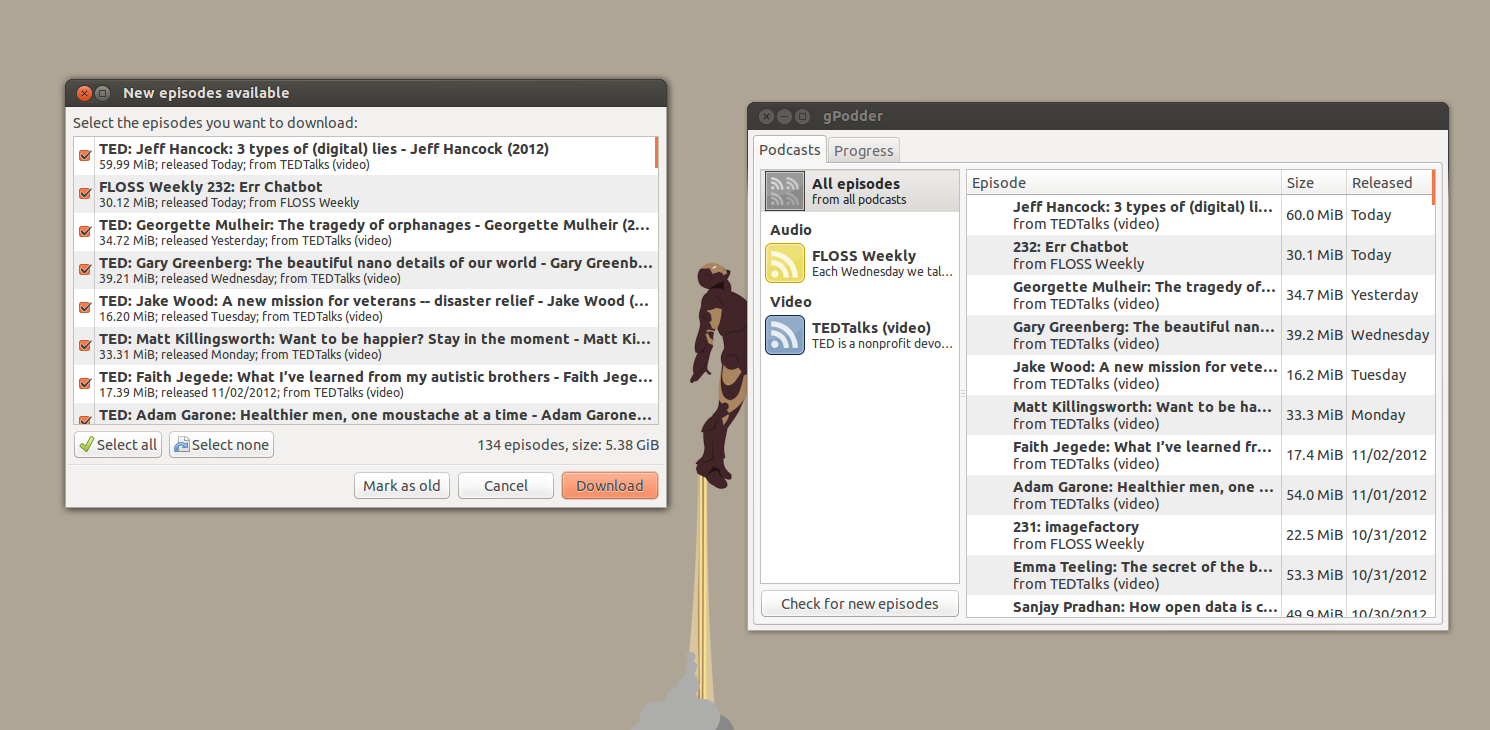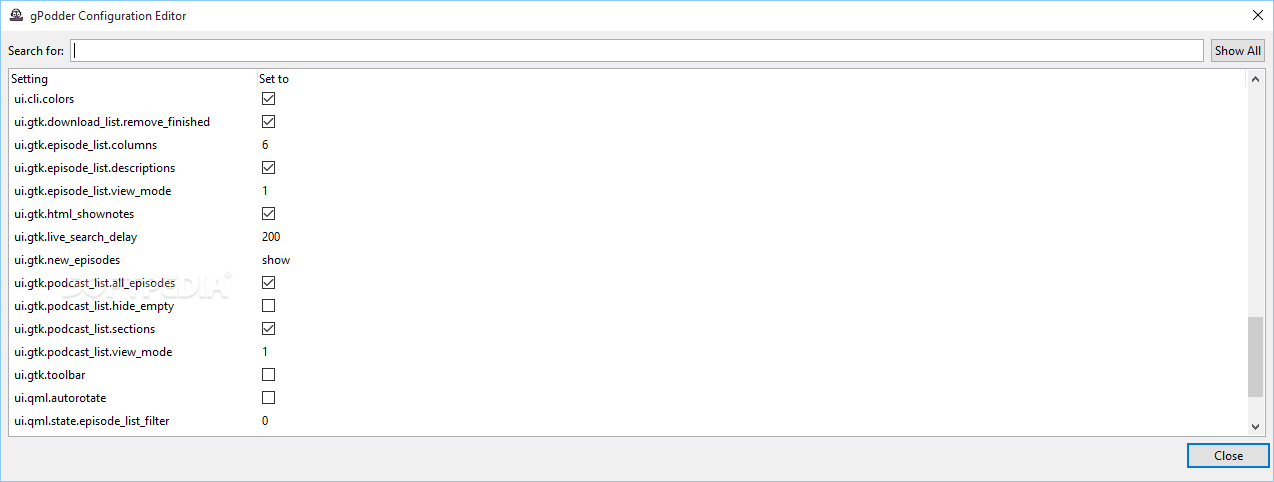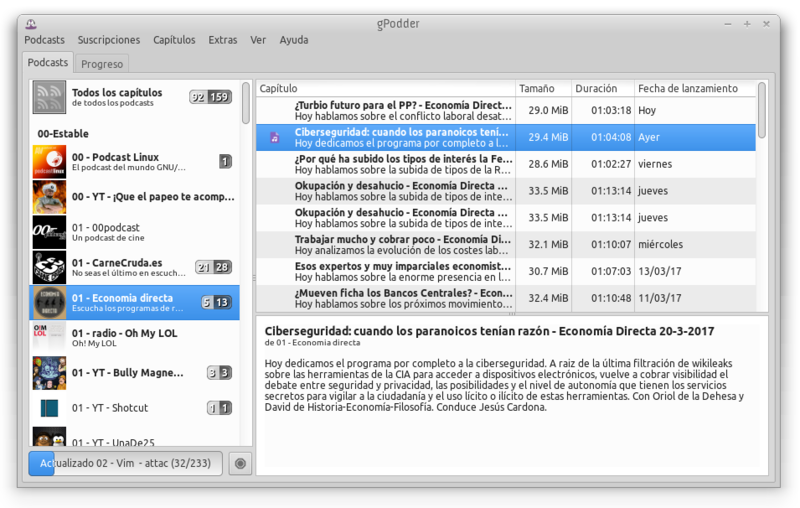


- DOWNLOAD GPODDER UPDATE
- DOWNLOAD GPODDER DOWNLOAD
- DOWNLOAD GPODDER WINDOWS
DOWNLOAD GPODDER UPDATE
We will not be adding new features, but if translators update the (now frozen) strings, we will also push out new updates every now and then. Maintenance mode means for us that we will only release updates in case bugs are found and reported. With the release of the "tres" branch, gPodder 2 is put into maintenance mode, with 2.20 being the latest release at the moment. Sha1sum: 32644629f534aaa33a13e3c1bc08f5fb2fcc07acįor packages in various distributions, see the downloads page.
Added support for Maemo 5 QML (N900) and MeeGo 1.2 Harmattan (N9). Dropped support for Maemo 4 (N800, N810) and Maemo 5 Hildon (N900). This means smaller package sizes and better disk usage. The new version will also use a system-wide installation of Python 2.7 and PyGTK, and auto-download the installers for these dependencies if they are not found. DOWNLOAD GPODDER WINDOWS
Better support for Windows: The Windows launcher has been refined, and Windows users can now also use the CLI in addition to the GTK GUI.
DOWNLOAD GPODDER DOWNLOAD
With Woodchuck installed, your device can detect which podcasts you like and automatically download the right episodes. Support for Woodchuck: Neal Walfield has contributed a plugin for his Woodchuck framework.
 Refined backend / data model: The codebase has been cleaned up and restructured, so it should be easier to maintain and add to in the future. Web UI: While this is still in its early stages, there is a small Web UI included that (when complete) will make it possible to manage gPodder via a web browser (with the help of a local, embedded web server). The QML UI is the only mobile UI supported in 3.0.0 (replacing the Hildon UI in previous releases). This UI can be used on touch-enabled netbooks/laptops and on mobile devices. New QML-based touch UI: In addition to the GTK UI and the command-line interface, gPodder 3 contains a QML UI for use with PySide. Improvements to the GTK UI, including support for showing the duration in the episode list, and hiding of columns in the episode list. This is very powerful, and can currently be used in the episode list of the GTK UI using "search-as-you-type". For example, you can use "(audio and downloaded and minutes < 10)" to show all downloaded audio files that are shorter than 10 minutes to listen to. EQL: The so-called " Episode Query Language" allows you to write queries against your podcasts. the gPodder downloaded data on your mobile device by pointing the $GPODDER_HOME environment variable to the storage device. Because all data is now stored in one folder, you can now use the Desktop version of gPodder to work on e.g. The database format has also been overhauled, you can use the "gpodder-migrate2tres" script to convert your gPodder 2 data to gPodder 3. New on-disk structure: Instead of having "gpodder-downloads" in your home folder, and the database and settings hidden away in another folder, all gPodder data is now stored in "gPodder" in your home directory (on Linux) or in "gPodder" in you "My Documents" folder (on Windows) or on the mass storage (MyDocs partition) on the N900 and N9. You can store your gPodder data on your mobile device directly for now (using $GPODDER_HOME) or wait for someone to implement a syncing plugin. Device synchronization removed: We have removed the ability to sync to iPod, MTP and filesystem-based MP3 players. There are too many changes to list them one by one, so I'll just give you a high-level overview of what's in for you: This is the release you have been waiting for for nearly a year - gPodder 3.0.0, the first release of the "tres" branch is out and ready for you to give it a test drive.
Refined backend / data model: The codebase has been cleaned up and restructured, so it should be easier to maintain and add to in the future. Web UI: While this is still in its early stages, there is a small Web UI included that (when complete) will make it possible to manage gPodder via a web browser (with the help of a local, embedded web server). The QML UI is the only mobile UI supported in 3.0.0 (replacing the Hildon UI in previous releases). This UI can be used on touch-enabled netbooks/laptops and on mobile devices. New QML-based touch UI: In addition to the GTK UI and the command-line interface, gPodder 3 contains a QML UI for use with PySide. Improvements to the GTK UI, including support for showing the duration in the episode list, and hiding of columns in the episode list. This is very powerful, and can currently be used in the episode list of the GTK UI using "search-as-you-type". For example, you can use "(audio and downloaded and minutes < 10)" to show all downloaded audio files that are shorter than 10 minutes to listen to. EQL: The so-called " Episode Query Language" allows you to write queries against your podcasts. the gPodder downloaded data on your mobile device by pointing the $GPODDER_HOME environment variable to the storage device. Because all data is now stored in one folder, you can now use the Desktop version of gPodder to work on e.g. The database format has also been overhauled, you can use the "gpodder-migrate2tres" script to convert your gPodder 2 data to gPodder 3. New on-disk structure: Instead of having "gpodder-downloads" in your home folder, and the database and settings hidden away in another folder, all gPodder data is now stored in "gPodder" in your home directory (on Linux) or in "gPodder" in you "My Documents" folder (on Windows) or on the mass storage (MyDocs partition) on the N900 and N9. You can store your gPodder data on your mobile device directly for now (using $GPODDER_HOME) or wait for someone to implement a syncing plugin. Device synchronization removed: We have removed the ability to sync to iPod, MTP and filesystem-based MP3 players. There are too many changes to list them one by one, so I'll just give you a high-level overview of what's in for you: This is the release you have been waiting for for nearly a year - gPodder 3.0.0, the first release of the "tres" branch is out and ready for you to give it a test drive.







 0 kommentar(er)
0 kommentar(er)
